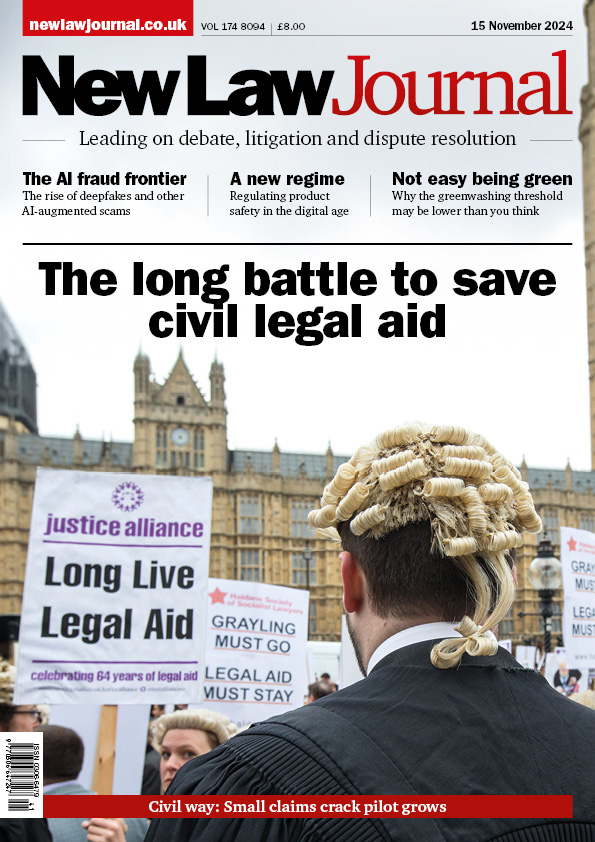THIS ISSUE

The proposed Product Regulation and Metrology Bill aims to provide a ‘pragmatic response’ to safety risks and technological opportunities arising since the late 1980s, but what are its implications for businesses which use artificial intelligence (AI) and their insurers? In this week’s NLJ, John Doherty, partner and head of regulatory, Penningtons Manches Cooper, considers what shape the Bill might take.
It feels like civil legal aid has been in crisis forever—so is the current system simply irreparable? In this week’s NLJ, Roger Smith, former director of JUSTICE, argues that we need a radical rethink.
The terrifying world of deepfakes, ‘cheapfakes’, dating scams, phishing and other artificial intelligence (AI) connivance is the subject of a fascinating article by Dan Wyatt, partner, Chris Whitehouse, senior associate, and Olivia Dhein, knowledge lawyer, RPC (Reynolds Porter Chamberlain), in this week’s NLJ.
Be on guard against ‘greenwashing’ as tough regulations are now in place. Moreover, the latest guidance available suggests a low threshold for culpability. In this week’s NLJ, Paige Coulter, associate at Quinn Emanuel Urquhart & Sullivan UK, with input from Julianne Hughes-Jennett, partner, sets out the risks involved and predicts a rise in litigation under the Companies Act 2006 and other legislation concerning allegations of greenwashing (publishing misleading information about the environmental or sustainability characteristics of a good, service or business).
In future there will be less money for creditors and more money for the official receiver—this outrage is exposed by NLJ columnist and former district judge Stephen Gold, in this week’s Civil Way.
For anyone interested in prison reform, John Cooper KC, of 25 Bedford Row, recommends a recently released film, Holloway, directed by Sophie Compton and Daisy-May Hudson.
Roger Smith on why he believes the model of civil legal aid developed as part of the post-war welfare state is bust
Paige Coulter & Julianne Hughes-Jennett map out the risky landscape of greenwashing regulation
Ian Smith combs through four cases addressing important issues of interpretation…including the reach of sexual harassment law
As a legal professional, you’re adept at building strong arguments for clients. But when it comes to securing a mortgage, shaping your financial narrative is equally important
MOVERS & SHAKERS

Winckworth Sherwood—Tim Foley
Property litigation practice strengthened by partner hire

Kingsley Napley—Romilly Holland
International arbitration team specialist joins the team

Red Lion Chambers—Maurice MacSweeney
Set creates new client and business development role amid growth
NEWS
The rank of King’s Counsel (KC) has been awarded to 96 barristers, and no solicitors, in the latest silk round
Early determination is no longer a novelty in arbitration. In NLJ this week, Gustavo Moser, arbitration specialist lawyer at Lexis+, charts the global embrace of summary disposal powers, now embedded in the Arbitration Act 1996 and mirrored worldwide. Tribunals may swiftly dismiss claims with ‘no real prospect of succeeding’, but only if fairness is preserved
The Ministry of Justice is once again in the dock as access to justice continues to deteriorate. NLJ consultant editor David Greene warns in this week's issue that neither public legal aid nor private litigation funding looks set for a revival in 2026
Civil justice lurches onward with characteristic eccentricity. In his latest Civil Way column, Stephen Gold, NLJ columnist, surveys a procedural landscape featuring 19-page bundle rules, digital possession claims, and rent laws he labels ‘bonkers’
Can a chief constable be held responsible for disobedient officers? Writing in NLJ this week, Neil Parpworth, professor of public law at De Montfort University, examines a Court of Appeal ruling that answers firmly: yes







